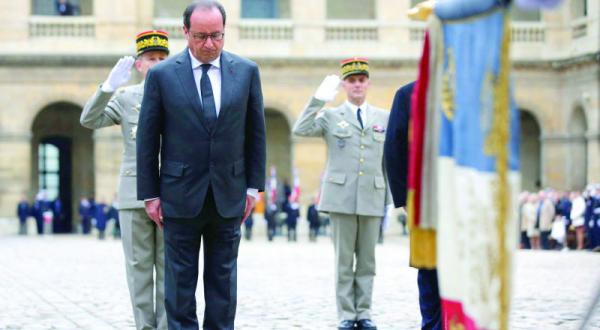
The French President Francois Hollande standing in front of the French flag at the Les Invalides hotel in Paris yesterday to mourn the victims of the recent terrorist attacks (E.P.A)
Amid concerns of a repeat of terrorist acts similar to those witnessed recently in Paris, France and other European countries have taken measures that seem unusual in the western world. The most notable of which are the freedom of the police to carry out administrative detention, blocking websites and closing down places of worship frequented by extremists.
France confirmed yesterday that it will extend the national state of emergency for three months, and this is a move that will allow the implementation of raids without judicial permission and the imposing of house arrest on anyone whose behaviour suggests that they are a threat to public security. However, MPs, lawyers, magistrates and journalists will be exempt from this.
In Belgium, the government said yesterday that it will enact new laws to imprison militants returning from Syria, close unregistered mosques and ban the sale of mobile phone lines to any unknown buyers. The new measures will also allow police to carry out raids during the night to search houses, something that is currently prohibited between 9pm and 5am.
The French Prime Minister Manuel Valls warned of the danger of France being exposed to a chemical or biological attack. The warning came after the Belgian authorities announced that they have discovered chemical substances during a raid.
The dangers of ISIS have appeared in countries far from Europe; the Kuwaiti authorities were able to disrupt a network financing the terrorist organisation. The network consisted of 10 people, most of whom were foreigners. The Minister of Interior said in a statement that the network includes a Lebanese person, an Egyptian person, 5 Syrians, some Australians and a Kuwaiti citizen.
In Washington, the CIA Deputy Director David Cohen described ISIS as being possibly the richest and most financed terrorist organisation indicating that the organisation possesses a lot of money, military equipment and weapons, and has a financial system which pays staff salaries and funds the production of propaganda tapes.
